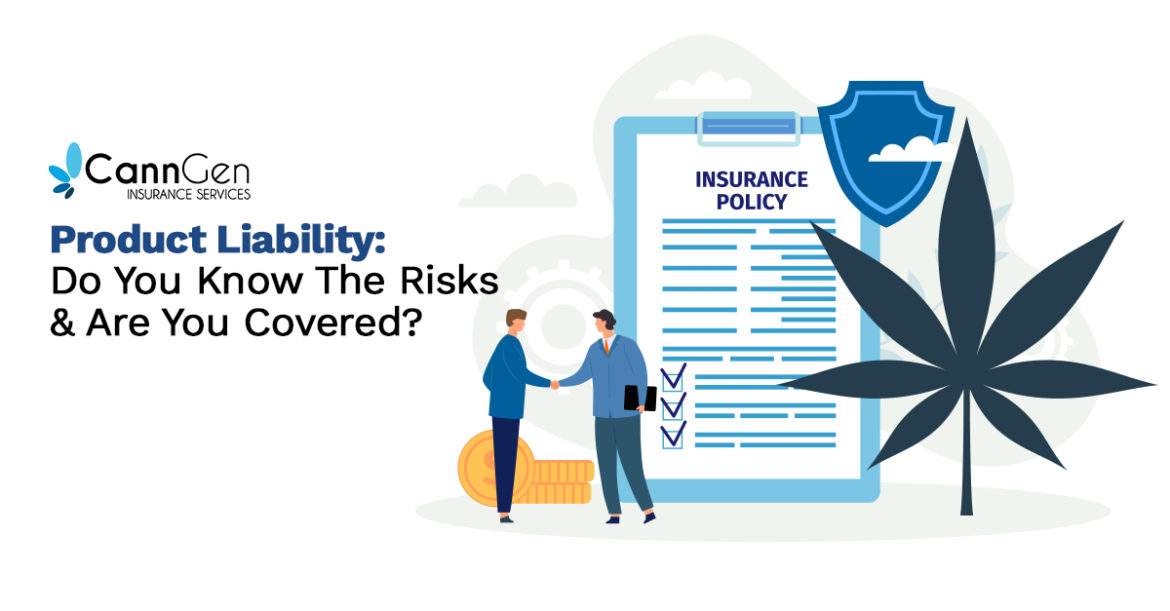
Product Liability: Do You Know the Risks & Are You Covered?
When manufacturing, distributing, or retailing consumer cannabis and hemp products, a worst case scenario is that these products harm your customers, potentially resulting in a liability lawsuit.
Product liability claims can be difficult to navigate, but companies can protect themselves against losses related to their occurrence with proper cannabis product liability coverage. Here we will look at product liability, potential risks, and how to make sure you are covered.
What is Product Liability?
Cannabis product liability involves claims that a consumer product linked to your business caused property damage, bodily injury, and other damages (first party claims) or that consumers using a product linked to your business caused harm or damage to others (third party claims).
Since the legalization of cannabis retail products, the industry has seen an uptick in product liability claims resulting from incidents as varied as lung damage from toxic vaporizers, injury from faulty vaporizer batteries, incorrect THC and CBD labeling, and regulatory compliance issues.
In a product liability lawsuit, every level of the chain of distribution can potentially be held liable, so even if you aren’t the manufacturer or the retailer of a product, you should consider adding product liability coverage to your insurance policy.
Learn more about Product Liability and its role in the cannabis industry.
What are the Risks?
One of the biggest risks associated with product liability is a potential lawsuit. Thankfully, it is possible to insure your business against such claims. Product liability coverage doesn’t protect your business from a liability lawsuit itself. Instead, it protects you against the financial fallout attached to a liability claim. An uninsured or even an underinsured business can face operations ending losses as a result of a product liability claim. Having product liability coverage means you will have the funds to recover business operations following a liability lawsuit.
Product liability claims usually fall under one of these categories:
- Negligence resulting in physical or property damage
- Breach of Contract with consumer product quality
- Intentional Misrepresentation in testing or labeling
- Design defects in consumer products
- Breach of Warranty arising from unsubstantiated claims
While the financial repercussions after a liability claim can be insured against, there are other penalties that may be attached to a product liability claim, including loss of license, negative perception in the marketplace, and more, so it is critical to minimize potential liability where possible.
How Can I Protect My Business?
The best way to defend your business against product liability lawsuits is to take steps to keep them from occurring in the first place. Here are some things on which you should focus in your business operations.
- Maintain cGMP standards in manufacturing
- Verify labels list correct ingredients and levels of active ingredients
- Produce clear, easy to follow instructions for use
- Ensure proper documentation and record keeping for regulatory compliance
- Only work with partners that take similar safety and quality control measures
Unfortunately, the reality is that, even when taking these precautions, it is still possible for liability claims to occur. Once businesses are aware of the financial risks associated with product liability, they understand the motivation behind getting covered against it. Discuss your need for product liability coverage with your insurance partner to make sure you are properly protected.
Looking for cannabis industry insurance partners you can trust to help you cover your business against real world risks? Learn more about how CannGen Insurance Services can connect you with the insurance coverage you need to protect your business.
More Cannabis Industry News
Want to stay up to date on the latest? You can find more on important topics in the cannabis industry on our blog.
Or get more information about comprehensive insurance solutions for the cannabis, CBD, and hemp industries from CannGen here.
Disclaimer: Information shared is for general purposes only.


 US
US
 US
US
 CA
CA
 EU
EU
